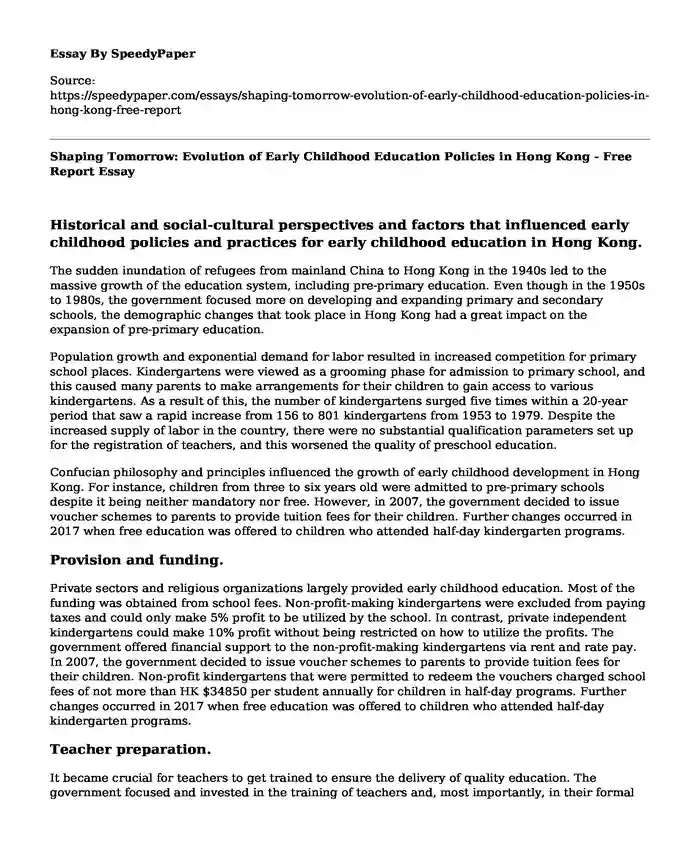
| Type of paper: | Essay |
| Categories: | Education Child development |
| Pages: | 3 |
| Wordcount: | 793 words |
Historical and social-cultural perspectives and factors that influenced early childhood policies and practices for early childhood education in Hong Kong.
The sudden inundation of refugees from mainland China to Hong Kong in the 1940s led to the massive growth of the education system, including pre-primary education. Even though in the 1950s to 1980s, the government focused more on developing and expanding primary and secondary schools, the demographic changes that took place in Hong Kong had a great impact on the expansion of pre-primary education.
Population growth and exponential demand for labor resulted in increased competition for primary school places. Kindergartens were viewed as a grooming phase for admission to primary school, and this caused many parents to make arrangements for their children to gain access to various kindergartens. As a result of this, the number of kindergartens surged five times within a 20-year period that saw a rapid increase from 156 to 801 kindergartens from 1953 to 1979. Despite the increased supply of labor in the country, there were no substantial qualification parameters set up for the registration of teachers, and this worsened the quality of preschool education.
Confucian philosophy and principles influenced the growth of early childhood development in Hong Kong. For instance, children from three to six years old were admitted to pre-primary schools despite it being neither mandatory nor free. However, in 2007, the government decided to issue voucher schemes to parents to provide tuition fees for their children. Further changes occurred in 2017 when free education was offered to children who attended half-day kindergarten programs.
Provision and funding.
Private sectors and religious organizations largely provided early childhood education. Most of the funding was obtained from school fees. Non-profit-making kindergartens were excluded from paying taxes and could only make 5% profit to be utilized by the school. In contrast, private independent kindergartens could make 10% profit without being restricted on how to utilize the profits. The government offered financial support to the non-profit-making kindergartens via rent and rate pay. In 2007, the government decided to issue voucher schemes to parents to provide tuition fees for their children. Non-profit kindergartens that were permitted to redeem the vouchers charged school fees of not more than HK $34850 per student annually for children in half-day programs. Further changes occurred in 2017 when free education was offered to children who attended half-day kindergarten programs.
Teacher preparation.
It became crucial for teachers to get trained to ensure the delivery of quality education. The government focused and invested in the training of teachers and, most importantly, in their formal entry requirements over the years. In the 21st century, the government continued to raise the standards for the application of teaching positions. Teachers were required to acquire a QKT status, and any new principal had to have completed a C (ECE)
Quality assurance and monitoring.
In the early years of this education system in Hong Kong, there was no stringent mechanism for evaluating kindergartens' services. The Inspectorate of the Education Department conducted only yearly inspections, and particular requirements were placed for registration, and this was not enough. Later on, a quality assurance framework was set up to evaluate ECE services and to enhance the effectiveness of schools. Since the introduction of voucher schemes, the schools needed to do self-evaluation, document a school report, and yearly school plan. The reports were then released to the public to enhance the transparency of the services offered in the kindergartens.
Curriculum models and approaches
Various models like Reggio Emilia and the Project Approach have been applied in many kindergartens in Hong Kong. These models are more focused on the children and their development in kindergartens leading to increased awareness of international trends in the development and implementation of the curriculum.
Assessment of the quality of pre-primary services.
The government put more effort into ensuring quality education services are provided to children in pre-primary schools. This was mainly done by reducing the teacher-pupil ratio, setting up curriculum models and approaches that helped the learning process, creating formal quality assurance mechanisms, and upgrading the required qualifications for both teachers and principals. In addition, the level of the teacher's understanding of the teacher’s approaches has also influenced the teaching-learning process and, as a whole, the quality of education provided.
Future of pre-primary education
With the new changes and opportunities brought by the policies formulated in 2013 by the Hong Kong government to implement free pre-primary school education, the future of early childhood education started to be bright. The way the government is very committed to developing early childhood education gives a positive light to the future of kindergartens in Hong Kong. In years to come, the quality of education will be enhanced, and education equity will be fully established for all children
Reference
Lau, C and Rao, N. (2018). Early Childhood Education in Hong Kong.
Cite this page
Shaping Tomorrow: Evolution of Early Childhood Education Policies in Hong Kong - Free Report. (2024, Jan 19). Retrieved from https://speedypaper.net/essays/shaping-tomorrow-evolution-of-early-childhood-education-policies-in-hong-kong-free-report
Request Removal
If you are the original author of this essay and no longer wish to have it published on the SpeedyPaper website, please click below to request its removal:
- Free Essay: Should Teenagers Be Given Birth Control?
- Healthcare Simulation Essay Sample
- Free Essay Sample on the Epistemology of Modern Digital Media
- Paper Example: Personal Statement for MD Application
- Free Essay. Training Healthcare Workers on Appropriate Social Media Representation
- Free Essay Sample: Course Reflective Summary
- Practices Aiding Positive Start to School - Essay Sample
Popular categories




